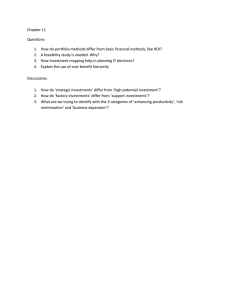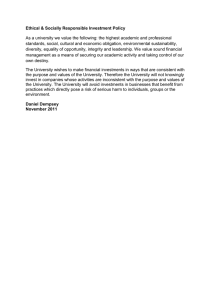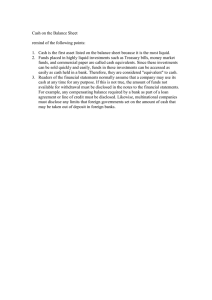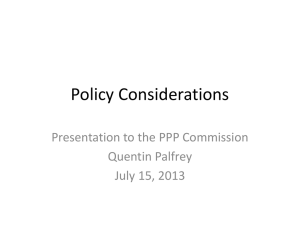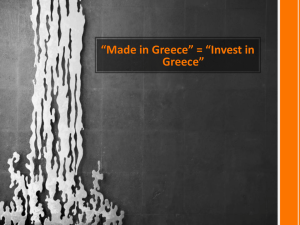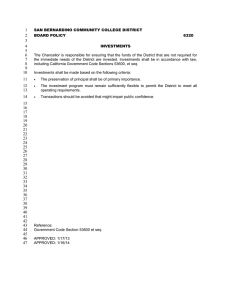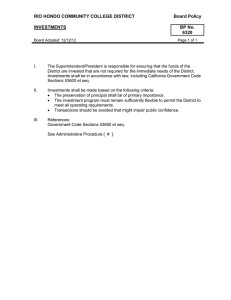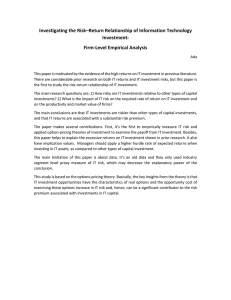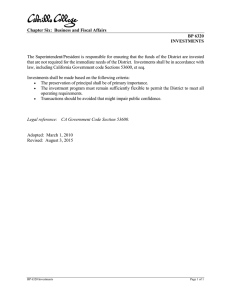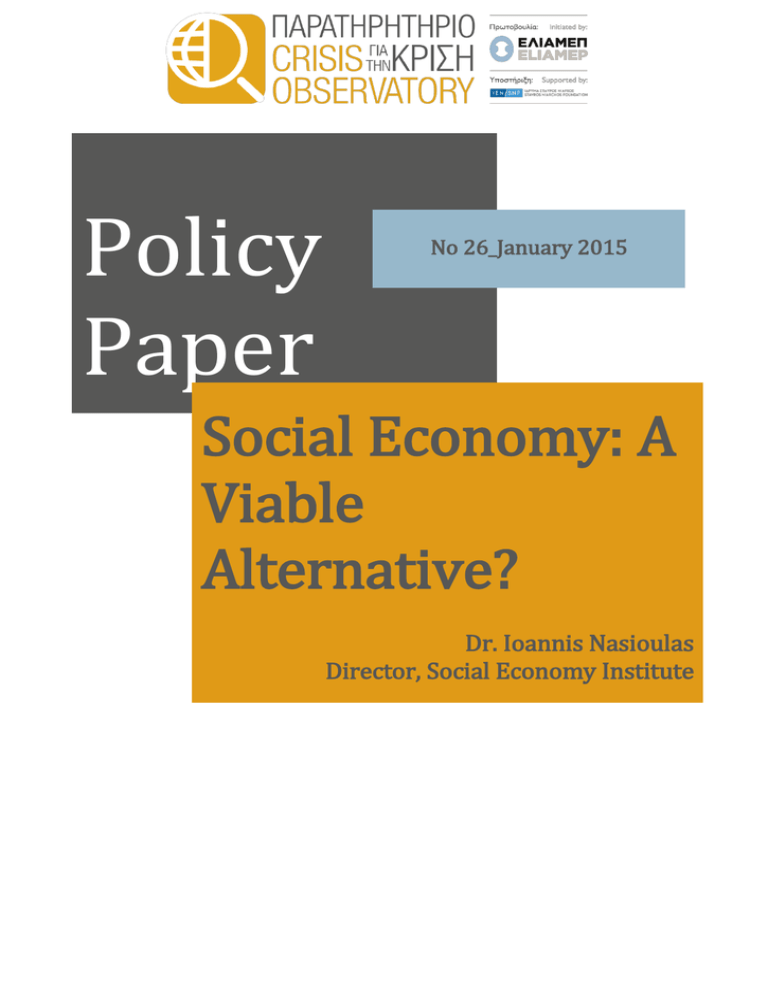
Policy
Paper
No 26_January 2015
Social Economy: A
Viable
Alternative?
Dr. Ioannis Nasioulas
Director, Social Economy Institute
Copyright © 2015
Hellenic Foundation for European and Foreign Policy (ELIAMEP)
49, Vas. Sofias Avenue, 106 76 Athens Greece
Tel.: +30 210 7257 110 | Fax: +30 210 7257 114 | www.eliamep.gr | eliamep@eliamep.gr
CRISIS OBSERVATORY | www.crisisobs.eu | info@crisisobs.gr
All Rights Reserved
Social Economy: A Viable Alternative?
Dr. Ioannis Nasioulas
Ioannis Nasioulas is Scientific Director of the Social Economy Institute, located in Thessaloniki, GREECE.
He obtained his Doctorate Diploma in Sociology (University of the Aegean, Greece), under Scholarship
of the Propondis Charitable Foundation, with research focus on Social Economy, Social Enterprises and
Social Impact Measurement. He is member of the European Commission’s Group of Experts on Social
Entrepreneurship (GECES) and Sub Group on "Social Impact Measurement", forming part of the “Social
Business Initiative” for the development of Social Economy and Social Enterprises in the EU. Ioannis
Nasioulas is also Expert to DG “Enlargement” TAIEX, facilitating the transfer of aquis communautaire to
EU candidate and connected countries. He is Evaluator for research and development projects funded
by the European Union’s “HORIZON 2020” programme and by international and Greek public and
private authorities. He is research associate to Academic Laboratories and associations in Greece and
abroad. Dr. Nasioulas has founded Social Economy Action Group, a civil society, voluntary organization
for the development of Social Economy in Greece. He has published various books, reports and articles
regarding social economy, social enterprises, active labour-market policies, innovative vocational
training regimes, legislation, national-accounting, evaluation and European Union policies and
governance.
ELIAMEP offers a forum for debate on international and European issues. Its non-partisan character
supports the right to free and well-documented discourse. ELIAMEP publications aim to contribute to
scholarly knowledge and to provide policy relevant analyses. As such, they solely represent the views of the
author(s) and not necessarily those of the Foundation.
2
Table of Contents
INTRODUCTION .......................................................................................................................................................... 5
Α. INVESTMENTS......................................................................................................................................................... 6
Α.1. Direct Foreign Investments and Social Bonds ............................................................. 6
Α.2. Public Investments Programme and the Social Clause ............................................... 6
Α.3. Liquidity and Social Banking ........................................................................................ 7
Β. EMPLOYMENT ........................................................................................................................................................ 8
Β.1. EU funding ................................................................................................................... 8
Β.2. Open Universities and Students Cooperatives ............................................................ 8
Β. 3. Social Economy Governance ...................................................................................... 8
C. COHESION ............................................................................................................................................................. 10
C.1. Business Empowerment and Micro Credit ................................................................ 10
C.2. Comparative Advantages and Thematic Cooperatives ............................................. 10
C.3. Sustainable Insurance and Mutual Funds ................................................................. 10
Epilogue .................................................................................................................................................................... 11
3
Social Economy: A Viable Alternative?
Dr. Ioannis Nasioulas
Abstract
Social investments could be an antidote to the crisis. By organizing a context of public,
private and direct foreign investments, which would bind them to measurable externalities
of enhancing quality employment and reconstituting social cohesion, Greece can step into
an environment of sustainable social development and rise of family incomes. In the sector
of social economy, there exist investment opportunities which can produce social value
added. In this paper, we inquire into a multifaceted and representative palette of proposals
with emphasis on social innovation.
Key Words:
Social Investment; Social Economy; Social Entrepreneurship; Social Impact Measurement
4
INTRODUCTION
Crisis, the priority given to macro‐economic stabilization and the chronic deficiencies of the
social state have gravely undermined social cohesion in Greece, with expanding inequalities,
disinvestment, unemployment, brain drain and poverty reaching new heights. Public
administration and the social partners have not yet presented a solid social policy context
that could provide a sustainable and convincing way out of the underdevelopment spiral.
Investing into the Social Economy could be a viable alternative. The Social Economy is the
sum of economic activities which involve private means and pursue social, collective or
public goals, thus being a third economic sector between the public and the private. Its most
visible constituent parts present either business or non-profit activity, and in some cases
combine both. Traditional Social Economy organizations are associations, foundations,
cooperatives and mutual insurance funds. The most intriguing addition to this rich palette is
social enterprises, which are corporations that are set up to pursue social goals, provide
goods and services to the market in economically significant prices and present measurable
positive social externalities.
We already know that Social Economy organizations are good employers, are quite resilient
to the crisis and provide ground for business and development experimentation. This
alternative economic sector links investments to employment and cohesion. And this is the
competitive advantage of Social Economy.
We should recognize that the pre-crisis welfare system is now facing systemic disinvestment
(e.g. austerity, privatization, isomorphism of public institutions to private ones, withdrawal
of the state out of thematic fields of service provision). The distribution of responsibilities
between private actors, public authorities and the Social Economy sector is shifting and
being reorganized affecting the accessibility, affordability, quality and impact of general
interest services’ provision. Public funding of organizations active in social service-provision
and cut-downs in public budgets are leaving considerable segments of the population
underserved. At the same time, a growing demand for individualized services of general
interest, owing to the re-profiling of personal needs and the evolution of social needs and
social risks is taking place. Thus market maturity, failures or repletion are directly expressed
as Social Economy potentials.
This agenda is of vital importance for the Greek people and the Greek economy. Through an
unprecedented effort, Greeks have managed to defend the European aquis and are now
committed to lead their economy towards a meaningful development path. Of course there
exist macro‐level conditionalities in light of the current fiscal consolidation context. The
recent rise of debt to GDP ratio implies a rising ratio of interest payments to GDP. This in
turn raises the income tax ratio. A higher income tax rate undermines economic dynamics
and hence narrows the opportunities for social policy innovation. Thus, the linkages
between economic dynamics and investment capital availability should not be neglected.
5
The value of Social Economy could be demonstrated in rendering optimal return on
investment when it comes to keeping society in one piece. In times of capital drain and
systemic social crisis, we ought to consider investing in the Social Economy.
Α. INVESTMENTS
Α.1. Direct Foreign Investments and Social Bonds
Direct foreign investments in Greece are suboptimal. A substantial part of the existing direct
foreign investments is not delivering sustainable jobs, for highly skilled employees and brain
drain is persistent. Additionally, much of the existing investment produces value added that
is credited to the mother companies abroad. There is need for quality investment that stays
and delivers here.
We should urgently consider opening-up credit lines for social investments, i.e. investments
in which the social benefit is measurable and sustainable. Available capital exists in the
international market and in emerging financial sectors, like in the impact investment
industry, which focuses on delivering ethical, social or environmental benefits. This also
includes the USA-based actors. By issuing social bonds, Greek institutions could access this
capital pool and social investors from abroad could be facilitated in entering the domestic
market, bound by social conditionalities.
Α.2. Public Investments Programme and the Social Clause
The public investments’ programme has for a long time been not adequately financed. The
current fiscal mix is subordinated to the restrictions of balanced budgets. Additionally,
Greece is obliged to systematically produce primary surpluses.
Existing investment flows are heavily oriented towards infrastructures, and human capital
development is not equally pronounced. Also, the national public investments’ programme
is in a single-way bound to the straight-jacket of EU funds and their availability. As a result
programmes with a genuinely local context are not always delivered in their original
conception.
Given the scarcity of capital, we need elevated social turnover of the existing investments
financed by the national budget. This could be achieved by presenting a context of social
reinvestment hand-in-hand with a set of conditionalities based on the social clause. Already,
Directive 2014/24 introduces new social conditionalities for innovative public procurement
in favor of social enterprises and socially sensitive corporations. Forming part of the work
done by the European Commission’s “Group of Experts on Social Entrepreneurship” (GECES)
an innovative methodology for the measurement of social impacts was produced and
published, taking into account public investments and banking financing as well. And Law
4019/2011 on Social Economy and Social Entrepreneurship has incorporated the “Social
6
Clause” in our legislation. Nevertheless, this provision is not valid erga-omnes and
throughout all kinds of publicly funded projects. So we need an all-inclusive regulatory
context that introduces social conditionalities for all contractors and investees.
We did not have an efficient reporting system by social stakeholders, end-users or
beneficiaries that would inform the social policy mainframe. And this evaluation failure has
been directly mirrored in the persistent skepticism on the actual impact, pay-off or economic
return yielded by social investments in the Social Economy sector. Latent private economic
capital is still underinvested in the Greek Social Economy and social enterprises are
underserved by the Greek banking system. Social banking criteria are missing. Social finance
by private sources sounds exotic and the political discourse revolves around the necessity to
establish new state banks that could finance the unbankables: small and medium
enterprises, social organizations or individuals which strive to get access to seed-capital so as
to flee the underdevelopment spiral. Nevertheless, no serious discussion is taking place on
how to introduce binding social conditionalities in (a) public procurement (b) and private
banking.
Α.3. Liquidity and Social Banking
There is urgent need for credit lines and especially for investment capital targeting social
externalities – if we want the Greek society to surpass the crisis intact. European Social
Entrepreneurship Funds (EUSEFs) is a version of well-organized ethical banks, active in the
Single Market and aiming at financing the part of the private economy which is committed
to public, social or collective goals. It is time to provide the ground for EUSEFs to be
established or at least undertake action in Greece in a pilot context. The recent EU-wide
auditing and stress-test task of over a hundred systemic banks is now completed and the
four systemic Greek banks seem to have the solid capacity of overcoming the most adverse
scenarios. Since re-capitalization is now over and the systemic banks can benefit from a
more solid ground, it is time for diversification in favor of social investments.
By opening-up the banking sector to social investments, social finance and social policy will
eventually meet. This agenda should be carefully constructed. To this point, social
investments were more or less in the domain of the public sector which also retained the
know-how and expertise. With the cooperation of the private sector and in relation to EU
funding lines visible budgets provided by the European Social Fund or the European Regional
Development Fund could be twinned. This could set out to link social policy with Social
Economy in deed. Along, the emerging Social Economy Single Market in the EU could as well
turn its investment interest in Greece, where demand is urgent.
7
Β. EMPLOYMENT
Β.1. EU funding
Gradually acknowledging the pressing need for a paradigm shift, the European Commission
launched the SOCIAL BUSINESS INITIATIVE in 2011 and the SOCIAL INVESTMENT PACKAGE in
2013. HORIZON 2020 funding programme is expected to act as a key mechanism for the
financing of social innovation mobilizing up to 80 billion euro. Along, the newly established
European Fund for Strategic Investments will leverage up to 315 billion of public-private
investments in a series of promising sectors.
In the current funding period of 2014-2020 Greek Regions are asked to administer a visible
part of the EU co funded budget. There is much skepticism about their actual operational
capacity. Absorbability in times of intense crisis is a political and technical bet.
Previous EU funding has not delivered optimal and sustainable results in Greece.
Investments were transformed into family budgets and inflationary money. There is still
much work to be done so as to have better targeted flows and more credible documentation
and auditing.
Β.2. Open Universities and Students Cooperatives
University knowledge, research experimentation and their applications should be open to
all. Linking academic activity to the market should be an agenda already there in the
university curricula. An idea is to promote the establishment of students’ cooperatives,
which could provide ground for proof of concepts and practices at an early stage. Business
experimentation and targeted social reinvestment should be in balance. Insurance coverage
by the state and a context of financial intermediation by private banks could contribute to
their sustainability.
We should aim at quality finance provided for example by the European Commission’s
funding programme HORIZON 2020, facilitating the link between universities, research
centers and innovative scientific enterprises.
Β. 3. Social Economy Governance
There exists no integrated and all-inclusive policy framework for social innovation. We
discourage practices of social responsibility by corporations, NGOs and public institutions,
with only scarce non-commercial examples of CSR. Either way, it’s already very difficult to
acknowledge the link between such diverse types of economic and social activity:
cooperatives, foundations, associations, mutuals and social enterprises, along with
conventional corporations with a visible social mark.
8
It could be meaningful to establish an Independent Authority for Social Economy and
Corporate Social Responsibility. Its mandate could include the formation of a regulatory
context of incentives and evaluation criteria in favor of ethical, social and environmental
externalities. The standardization process could expand in groundbreaking modalities such
as the utilization of Innovation Management Systems, the implementation of EU Directive
1025/2012 and Quality Management Systems. Standardisation and innovation are often
perceived as conflicting processes. Whereas innovation strives for excellence and exclusivity,
standardisation strives for predictability and a level playing field, and standards are in many
aspects a public good. However, in an apparent paradox, standardisation can make an
important contribution to innovation. Standards thus play a role in facilitating
interoperability, safety and trust, whilst leaving ample room to innovators for capturing the
market on the basis of novelties in other aspects of the product, service or process.
This standardization process is expected to enhance the fundability and creditworthiness of
the corporate section of Social Economy and ensure accountability and transparency for its
non-profit part.
9
C. COHESION
C.1. Business Empowerment and Micro Credit
The social policy deficit, as expressed by low early-stage investments, inadequate support
through the whole life-cycle of individuals, support to the construction of collective
capabilities and the absence of a serious minimum-income security net, is expected to
reproduce the vicious effects of the crisis long after fiscal stability has been achieved. Active
local employment development strategies are needed.
We should focus on building a microcredit strategy with innovative banking that provide for
business empowerment. Such products could be allocated both by systemic and other
banks, along with the cooperative ones. Also, of critical importance is to conclude to a
variety of business empowerment bank accounts, where capital is allocated to individuals
that have proven capable of saving money earned by business activity, mobilization and
experimentation.
Instead of undertaking the risk of creating a new vehicle –even worse: a public one- we
should provide a context of conditionalities regarding the optimal utilization of existing
assets, with market criteria. Still, we are short of a synchronization process that could
establish compatibility paths with the emerging methodological orientations as set by the
European Commission’s Sub Group of Experts on Social Impact Measurement and its recent
Report: “Proposed Approaches to Social Impact Measurement in European Commission
legislation and in practice relating to: EuSEFs and the EaSI”.
C.2. Comparative Advantages and Thematic Cooperatives
Greece has a visible venture philanthropy capacity yet it’s only latent when it comes to
investments in impact and social entrepreneurship. No networking mechanisms are there to
twin demand with supply of quality capital. Along, there is high expectation for thematic
markets with visible potential such as energy or maritime cooperatives. We need an
investment policy that recognizes the comparative advantages of these industries and makes
latent capital available for investment.
C.3. Sustainable Insurance and Mutual Funds
Zero deficit clauses for pension funds create intense pressure to the insurance system. Many
structural perils are now intensifying taking account the rise of unemployment and the
collapse of insurance contributions. This peril could result in consecutive eventual bail-ins by
tax payers in the years to come.
10
There exist few but quite solid mutuals in Greece and this is due to their preferential
treatment by legislators throughout a rather inglorious corporatist historical path. This is
unfair. We should strive to facilitate the establishment of all-inclusive mutuals in the third
pillar of the insurance system.
Epilogue
In order to have a viable Social Economy agenda, we need both the regulatory and financial
framework ambitiously reformed. Capital allocated for Social Economy is social investment
and not fiscal cost. Would it be of value considering the exemption of such flows out of the
national-accounting estimation of the annual deficit? On what grounds would the European
Commission enter such a debate?
11
12
49, Vas. Sofias Ave. 10676 Athens, Greece | Τel. +30 210 7257 110 | Fax +30 210 7257 114 | E-mail eliamep@eliamep.gr

